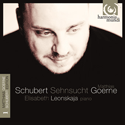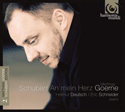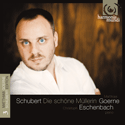![Matthias Goerne [Photo by Marco Borggreve for harmonia mundi]](http://www.operatoday.com/GOERNE_Borggreve006.gif)
19 Jun 2009
Goerne and Eschenbach : Winterreise
When Matthias Goerne was six, he heard Winterreise and was captivated.
English Touring Opera are delighted to announce a season of lyric monodramas to tour nationally from October to December. The season features music for solo singer and piano by Argento, Britten, Tippett and Shostakovich with a bold and inventive approach to making opera during social distancing.
This tenth of ten Live from London concerts was in fact a recorded live performance from California. It was no less enjoyable for that, and it was also uplifting to learn that this wasn’t in fact the ‘last’ LfL event that we will be able to enjoy, courtesy of VOCES8 and their fellow vocal ensembles (more below …).
Ever since Wigmore Hall announced their superb series of autumn concerts, all streamed live and available free of charge, I’d been looking forward to this song recital by Ian Bostridge and Imogen Cooper.
The Sixteen continues its exploration of Henry Purcell’s Welcome Songs for Charles II. As with Robert King’s pioneering Purcell series begun over thirty years ago for Hyperion, Harry Christophers is recording two Welcome Songs per disc.
Although Stile Antico’s programme article for their Live from London recital introduced their selection from the many treasures of the English Renaissance in the context of the theological debates and upheavals of the Tudor and Elizabethan years, their performance was more evocative of private chamber music than of public liturgy.
In February this year, Albanian soprano Ermonela Jaho made a highly lauded debut recital at Wigmore Hall - a concert which both celebrated Opera Rara’s 50th anniversary and honoured the career of the Italian soprano Rosina Storchio (1872-1945), the star of verismo who created the title roles in Leoncavallo’s La bohème and Zazà, Mascagni’s Lodoletta and Puccini’s Madama Butterfly.
Evidently, face masks don’t stifle appreciative “Bravo!”s. And, reducing audience numbers doesn’t lower the volume of such acclamations. For, the audience at Wigmore Hall gave soprano Elizabeth Llewellyn and pianist Simon Lepper a greatly deserved warm reception and hearty response following this lunchtime recital of late-Romantic song.
Collapsology. Or, perhaps we should use the French word ‘Collapsologie’ because this is a transdisciplinary idea pretty much advocated by a series of French theorists - and apparently, mostly French theorists. It in essence focuses on the imminent collapse of modern society and all its layers - a series of escalating crises on a global scale: environmental, economic, geopolitical, governmental; the list is extensive.
For this week’s Live from London vocal recital we moved from the home of VOCES8, St Anne and St Agnes in the City of London, to Kings Place, where The Sixteen - who have been associate artists at the venue for some time - presented a programme of music and words bound together by the theme of ‘reflection’.
'Such is your divine Disposation that both you excellently understand, and royally entertaine the Exercise of Musicke.’
Amongst an avalanche of new Mahler recordings appearing at the moment (Das Lied von der Erde seems to be the most favoured, with three) this 1991 Mahler Second from the 2nd Kassel MahlerFest is one of the more interesting releases.
‘And there was war in heaven: Michael and his angels fought against the dragon; and the dragon fought and his angels, And prevailed not; neither was their place found any more in heaven … that old serpent … Satan, which deceiveth the whole world: he was cast out into the earth, and his angels were cast out with him.’
If there is one myth, it seems believed by some people today, that probably needs shattering it is that post-war recordings or performances of Wagner operas were always of exceptional quality. This 1949 Hamburg Tristan und Isolde is one of those recordings - though quite who is to blame for its many problems takes quite some unearthing.
There was never any doubt that the fifth of the twelve Met Stars Live in Concert broadcasts was going to be a palpably intense and vivid event, as well as a musically stunning and theatrically enervating experience.
‘Love’ was the theme for this Live from London performance by Apollo5. Given the complexity and diversity of that human emotion, and Apollo5’s reputation for versatility and diverse repertoire, ranging from Renaissance choral music to jazz, from contemporary classical works to popular song, it was no surprise that their programme spanned 500 years and several musical styles.
The Academy of St Martin in the Fields have titled their autumn series of eight concerts - which are taking place at 5pm and 7.30pm on two Saturdays each month at their home venue in Trafalgar Square, and being filmed for streaming the following Thursday - ‘re:connect’.
The London Symphony Orchestra opened their Autumn 2020 season with a homage to Oliver Knussen, who died at the age of 66 in July 2018. The programme traced a national musical lineage through the twentieth century, from Britten to Knussen, on to Mark-Anthony Turnage, and entwining the LSO and Rattle too.
With the Live from London digital vocal festival entering the second half of the series, the festival’s host, VOCES8, returned to their home at St Annes and St Agnes in the City of London to present a sequence of ‘Choral Dances’ - vocal music inspired by dance, embracing diverse genres from the Renaissance madrigal to swing jazz.
Just a few unison string wriggles from the opening of Mozart’s overture to Le nozze di Figaro are enough to make any opera-lover perch on the edge of their seat, in excited anticipation of the drama in music to come, so there could be no other curtain-raiser for this Gala Concert at the Royal Opera House, the latest instalment from ‘their House’ to ‘our houses’.
"Before the ending of the day, creator of all things, we pray that, with your accustomed mercy, you may watch over us."
![Matthias Goerne [Photo by Marco Borggreve for harmonia mundi]](http://www.operatoday.com/GOERNE_Borggreve006.gif)
When Matthias Goerne was six, he heard Winterreise and was captivated.
Obviously, he was too young to understand all the complex emotions in the piece but what he recognized was that they mattered. Winterreise is so powerful that even a child, albeit a talented one, could be inspired to commit it to memory.
There have been hundreds of Winterreises at the Wigmore Hall over the years. This is an audience that knows the work bar by bar and isn’t easily impressed, so when most of the house stood up in applause it was serious praise indeed. I first heard Goerne sing Winterreise some 15 years ago, near the start of his adult career (he was a child prodigy in East Germany). He was only 26, yet Irwin Gage was playing, and Alfred Brendel was listening in the stalls, rapt with attention. Goerne and Brendel became a legendary partnership, creating some of the finest Schubert performances ever produced. Their recording of Winterreise is one of the must-hear classics.
Christoph Eschenbach is a superlative Schubert performer too, so this new series of Schubert cycles at the Wigmore Hall is a significant event. Goerne and Eschenbach have already recorded Die schöne Mullerin as part of the new Harmonia Mundi Schubert Edition. Goerne’s earlier recording of that cycle is exceptional. Quite frankly, you can’t “know” that cycle without having heard that recording, because it puts paid to the myth that the cycle is sweet and innocent. Darker undercurrents almost always flow through the Romantic.
With Eschenbach, Goerne’s refining his approach to Winterreise yet again, this time even more cognizant of the structural underpinnings beneath the text. Each song marks a different stage in the journey, and those stages are in themselves significant, to be savoured for what they portend. The journey starts in a huff, the protagonist impulsively dashing out of town, the wind images in ‘Die Wetterfahne’ expressing turbulent confusion. Gradually the woman who caused the problem fades into a more generalised image on which the man can hang his feelings. ‘Der Lindenbaum’ is a temporary halt, a short moment of calm before “Die kalten Winde bliesen..” Then the true impact of the words “ich wendete mich nicht” sinks in.
This is a psychological journey, away from the town and its bourgeois values. The protagonist is out in the wilderness, in uncharted territory, where only animal spoor marks a path. Thus Goerne and Eschenbach employ a deliberate, watchful pace: paying close attention to each passage, every detail counts. Eschenbach even brought out the faint pre echo of the posthorn that appears as early as ‘Der Lindenbaum’. Similarly, the village dogs appear, in the rhythms that start ‘Im Dorfe’.
Landscape is important in Winterreise: it is a mirror of the protagonist’s soul. Schubert builds images of nature into the piano part not merely to illustrate text, but to act as an alter ego, almost a third party commentary beyond the protagonist’s highly subjective anguish. Pathetic fallacy operates, of course, for the protagonist hears his troubles reflected in the storm and swollen river, and sees frost patterns as flowers. But there’s infinitely more to the idea of Nature in the Romantic imagination. It stands as a symbol of something greater than mankind, something that endures beyond the personal and immediate.
This has implications for interpretation. Some performances depend on exaggeratedly emotional singing, on the assumption that the protagonist must be mad, since he gives up civilization to follow a crazy old beggar. Thus follows the idea that the journey can only end in death. But that trivializes the whole logic behind the cycle. If the protagonist is mad, why are we so drawn into this psychodrama? Wilhelm Muller – and Schubert – wanted us to experience the journey through the man’s feelings, to sympathize with why someone should choose a wilder path in life. Perhaps in more psychologically repressed times the idea of madness and death prevailed but for the Romantics angst was a code for what we now call the subconscious. The Romantic interest in emotional extremes was a reaction to the tidy elegance of classicism. Schubert’s contemporaries were troubled by the world Winterreise revealed, and rightly so.
The protagonist is driven to his limits but never loses sight of the world around him, even though he interprets it in terms of himself, for example when he thinks the crow is a companion. In that sense he’s not a depressive, turned entirely away from reality. Some point to ‘Der Nebensoonen’ as evidence that the man must be nuts if he sees three suns in the sky. But it’s a physical phenomenon that in extreme cold, the sun appears distorted in this way. For a century, we’ve become so used to electricity and urban living that we can’t imagine such things as reality. Goerne sings with quiet, understated dignity, as if he’s witnessing a miracle in nature. True, the protagonist still sees the eyes of his beloved wrought as huge cosmic images in the sky, but perhaps there’s something more.
The cycle ends with the strange hurdy-gurdy of ‘Der Leiermann’. The Leier isn’t a lyre, but a primitive instrument, turned rather than played, making a mechanical circular sound. The old man is “Baarfuss auf dem Eise”, barefoot on the ice, exposed to the elements, without a shred of bourgeois respectabilty. And yet he doggedly makes his way from village to village, despite being hounded by dogs and men. “Wunderlicher Alter!” sings the protagonist, what kind of phenomenom is this? Orpheus in rags?
Goerne sings the final sentence with overwhelming grace and wonder. “Willst zu meinen Liedern deine Lieier drehn?” Will the man follow the old beggar, who perhaps once set out on a similar journey? Perhaps he’s like the crow, whose companionship is coincidental not real. But the old man is human and plays a vaguely musical instrument. Perhaps he’s a symbol of the power of music, which like Nature endures whatever may happen to an individual. Throughout the cycle, the rhythms of the hurdy gurdy and lurching footsteps lurk in the shifts of pace and intensity. The Leiermann haunts the whole piece, though it takes performance of this very high standard to bring them out.
Anne Ozorio
 |
 |
 |
| Sehnsucht | An mein Herz | Die schöne Müllerin |